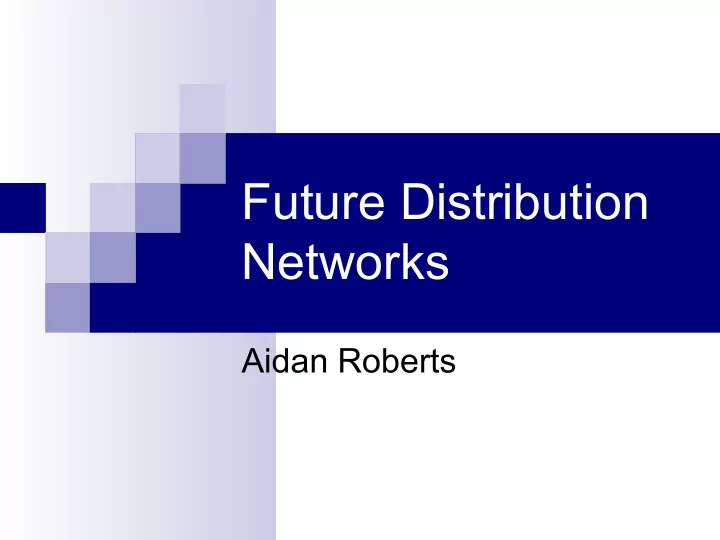

Future Distribution Networks Aidan Roberts
Outline Investigation Area Placements Highlights Closing thoughts
Investigation Area Proposed Distributed Generation Smart Networks Network Operation AMI Smart Networks/ Intelligent/ Smart grid Intelligence - “The ability to acquire and apply knowledge and skills” Acquire Knowledge - Increased Monitoring/Information Skills - Analytics/Modelling Apply Knowledge – Process & Guidelines Skills – Technology functionality A means of achieving high level energy policy objectives
EUTPS Definition “an electricity network that can intelligently integrate the actions of all users connected to it - generators, consumers and those that do both - in order to efficiently deliver sustainable, economic and secure electricity supplies.”
Placements Proposed OFGEM (6 months) – September 2008 EA Technology (6 months) – April 2009 Landis + Gyr (6 months) EDF Energy Networks (6 months) Actual OFGEM (6 months) – September 2008 EA Technology (7 months) – April 2009 Landis + Gyr (10 months) – February 2010
Ofgem - UK Policy Analyst Quality of Service Department Worst Served Customer Policy Environment Department Business Carbon Footprint (BCF) Methodology & Reporting Template Other Innovation Funding Incentive (IFI) Registered Power Zones (RPZs) Distributed Generation (DG) Incentive
EA Technology Consulting -UK Consulting Engineer New Energy Technologies IEA Implementing Agreement - ENARD Subtask 1 - Regulatory frameworks and business models conducive to the development of Smart Grids IEA Implementing Agreement – DSM - Task XIX: Subtask 3 - Micro Demand Response and Energy Savings Strategic Technology Programme (STP) Module 5 “DER for Networks” Report - “Smart Meters: Next Steps”
Landis + Gyr - France R & D Engineer Advanced Metering Systems Development of G3 PLC ErDF specification Maxim Modem OFDM IPv6 via 6LowPAN Adaption layer
G3 PLC MV - MV Trial MV - LV Trial LV - LV Trial Frame Frame Frame Theoretical Error Error Error Data Rate Data Rate Rate Data Rate Data Rate PLC Type Carriers (bps) (bps) (FER) Rate (FER) Rate (FER) S-FSK Single 2400 880 0% 763 12% 880 0% OFDM 36 35 000 6092 0% 4175 1% 5700 0% OFDM 92 128 000 2038 7% 1400 38% 630 40%
Technical Learning Technical Ofgem Regulation Incentive mechanism development Importance of consultation process EA Technology DSM Smart Metering National & International Collaboration Exposure to “Smart Grid” activities around the world L + G Communications Software Development Standards & Interoperability
Personal development Confidence Adaptability Languages Cultures Industries Awareness Community Social Political Environmental
Closing Thoughts Great experience Career Personal Some of my objectives not achieved Lack of DNO placement Timing – real developments over next 12 to 18 months Other new objectives were added
Thanks Bon voyage et bon courage!
Closing thoughts The smart grid is a name given to a suite of technologies and associated applications that will help to deliver future energy policy objectives – sustainability, competitiveness and affordability Given the natural differences in drivers and operating environment, each implementation of a smart grid can be different The ‘smart’ in smart grid refers to greater understanding (monitoring), embedded intelligence and overlaid IC&T The smart grid is focused on Electricity Networks however networks cannot be separated from the overall electricity system Distribution networks are heavily impacted due to the lack of monitoring, high proportion of assets & natural interface to consumers A noticeable shift from ‘generation-centric’ to ‘consumer-centric’ networks Effective application requires understanding your drivers & scope of application but also being aware of the bigger picture There is much to be gained from Collaboration Cross stakeholder (Distribution, Transmission, Generation, Manufacturers, Academia) Cross borders (states or countries) Be aware and actively Influence energy policy and regulation Contrary to innovation in the past, smart grid is here to stay, as it is the only way to achieve policy objectives Smart grids wont just happen: a lot of work needs to be done, a lot of learning’s and most likely a lot of mistakes Trials are important, they may be expensive and time consuming however they will save money in the long run and enable effective large scale application Culture change is needed to encourage lateral thinking Rollout staging is important particularly with large scale technologies. New systems should be designed to meet end state but will also need to handle transition periods Resources are needed for smart grid and business as usual Smart grid can attract a new workforce It is an exciting time to be an engineer in the ESI
Energy Exported to Grid Solar Bonus Scheme 1000.0 1500.0 2000.0 2500.0 3000.0 3500.0 4000.0 4500.0 500.0 0.0 KW connected capacity (total, est/act) MWh feed-in per month Sep-08 Oct-08 Nov-08 Dec-08 Jan-09 Feb-09 Mar-09 Apr-09 May-09 Jun-09 Monthly Energy / Installed Capacity Jul-09 Aug-09 Sep-09 Oct-09 Nov-09 Dec-09 Jan-10 Feb-10 Mar-10 Apr-10 May-10 Jun-10 Jul-10 Aug-10 Sep-10 Oct-10 Nov-10 Dec-10 Jan-11 Feb-11 Mar-11 0 20000 40000 60000 80000 100000 120000 Solar PV Systems in Service
Solar Bonus Scheme Grid-connected Solar PV system installed capacity - ENERGEX Connected generation capacity (Megawatts) 140.0 116.6 120.0 103.3 100.0 88.0 92.1 76.9 80.0 68.9 61.1 54.2 60.0 46.9 36.841.5 40.0 1.6 2.1 2.7 3.2 3.5 4.3 5.3 6.0 6.3 7.3 9.0 10.512.1 14.317.4 20.423.8 27.831.3 20.0 0.0 Nov-08 Nov-09 Nov-10 Jan-09 Feb-09 Mar-09 Jun-09 Jul-09 Jan-10 Feb-10 Mar-10 Jun-10 Jul-10 Jan-11 Feb-11 Mar-11 Oct-08 Dec-08 Apr-09 May-09 Aug-09 Sep-09 Oct-09 Dec-09 Apr-10 May-10 Aug-10 Sep-10 Oct-10 Dec-10
Outline 15-20 mins Idea is for each of you to present a summary of your overseas experiences under the scholarship – suggest you cover – your objectives, your program, highlights of your technical learning, highlights of personal development, overall view on how worthwhile it was to you and in meeting the scholarships objectives
Recommend
More recommend